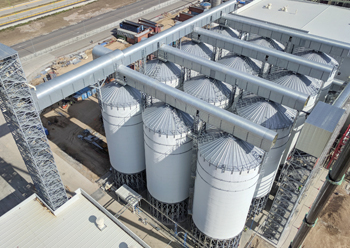
Food storage facilities have been proposed for the Gulf to ensure their food security and counter market volatility.
Food processing clusters mooted
01 January 2020
In a bid to address the food security concerns of the region, huge food processing clusters have been proposed for the Gulf region.
In an interview with ABDULAZIZ KHATTAK for Gulf Construction magazine, Mikhail-Shamil Orlov, an influential Russian food investor and expert, said there is a need to build food reserves, considering the growing imbalance between demand and supply because of a burgeoning population. Food shortage, he added, could pose a real political threat to governments.
In his view, the Gulf countries offer a prime location for a central bank of food grains because of their exemplary security, and Bahrain is ideal because of its modern port facilities.
 |
|
Orlov ... already in negotiations with four governments in the region. |
Orlov is President of the Russian-Egyptian Business Council and is the grandson of the late King Farouk of Egypt. He is also on the board of a dedicated project called Agrofinmost, which was set up in 2018 and chaired by Mufti Muhammad Taqi Usmani, a leading scholar of Islamic finance and chairman of the Bahrain-based Accounting and Auditing Organisation for Islamic Financial Institutions (AAOIFI).
For the project, Orlov suggests two storage models. One, he said, is for countries incapable of producing their own food and such countries should have at least two years of food supply to counter market volatility, such as the global rice crisis of 2007-08.
“Two years allow enough lead time for replenishing reserves at the next harvest, when prices are much lower,” he pointed out.
The second storage model could be used to establish a stabilisation or intervention fund, which would allow the flow of food to affected areas or countries, according to Orlov.
While the storage facilities could be built anywhere, the Middle East has a strong potential because of its importance in the Muslim world, he added.
He says a grain storage bank in the Gulf can offset any volatility anywhere by supplying to markets that require stability.
Russia, currently the world’s largest wheat exporter and a country with the largest arable land, would be a key supplier.
According to Orlov, the state-of-the-art facilities could be part of wider food clusters, which would not only include food storage facilities and terminals but processing units as well.
“Having such massive food processing clusters close to a grain storage facility would not only address the needs for quality processed food, but could also allow a country like Bahrain to become an exporter of food,” he said. “These clusters not only offer a way to localise the food value chain and add value to the economy, but they also add to the country’s food security.”
Without disclosing names and locations, Orlov said his team was already in negotiations with four governments in the region for the projects.
About the size of investment, he gives a ballpark figure between €270-350 per tonne of capacity. But said this figure could go up in countries where infrastructure was weak or absent and where investment in ports, docks, roads, railway lines, electricity was an imperative to house such a project.
For investors willing to put their money in the food processing cluster model, Orlov said the returns are quick. “These clusters are highly efficient. And the payback period compared to an investment in another industry was, at least, 20 per cent shorter.”
Agrofinmost – which has received approval from leading authorities in the Muslim world – will use Islamic finance instruments to attract investments from Muslim countries into the Russian agricultural sector and in return establish sustainable channels for food supply to Muslim countries.
Overall, the Agrofinmost project offers numerous benefits for both the exporter (Russia) and importing countries – mostly Muslim and where the demand for food security is high, said a spokesman for the project.
He said it will also allow the development of new logistic routes to Muslim countries, including using the North-South international transport corridor.
However, a consistent supply of funds from the importing countries could be a challenge as would be the development of Russia’s export infrastructure to meet demand.
In May last year, Russian President Vladimir Putin issued a decree to increase the country’s agricultural exports from the current $24 billion to $45 billion in 2024.
Russia is well positioned to do that because of its vast expanses of arable land.
According to estimates, Russia has the potential to produce an excess of 100 million tonnes of grain over its domestic consumption making it a leading supplier.
The Agrofinmost project has the potential to bring in billions of dollars’ worth of investments into various aspects of the food production/supply chain including hub elevators and grain storages, development and expansion of port capacity, grain hoppers, and transport systems.
- Alba’s Line 6 among the fastest commissioned
- Bahrain to spend $1.62bn on utility projects
- China firm to build 3,000 homes in East Sitra Town
- Marassi Al Bahrain project marks milestone
- Bahrain gets Kuwait funding for 400-kV project
- Iraq seeks bids for JV oil pipeline project
- EK Kanoo opens Michelin truck service centre
- Kuwait refinery modules completed
- Avenues Bahrain to expand
- Ground broken on coke calcining facility
- Food processing clusters mooted
- In brief


